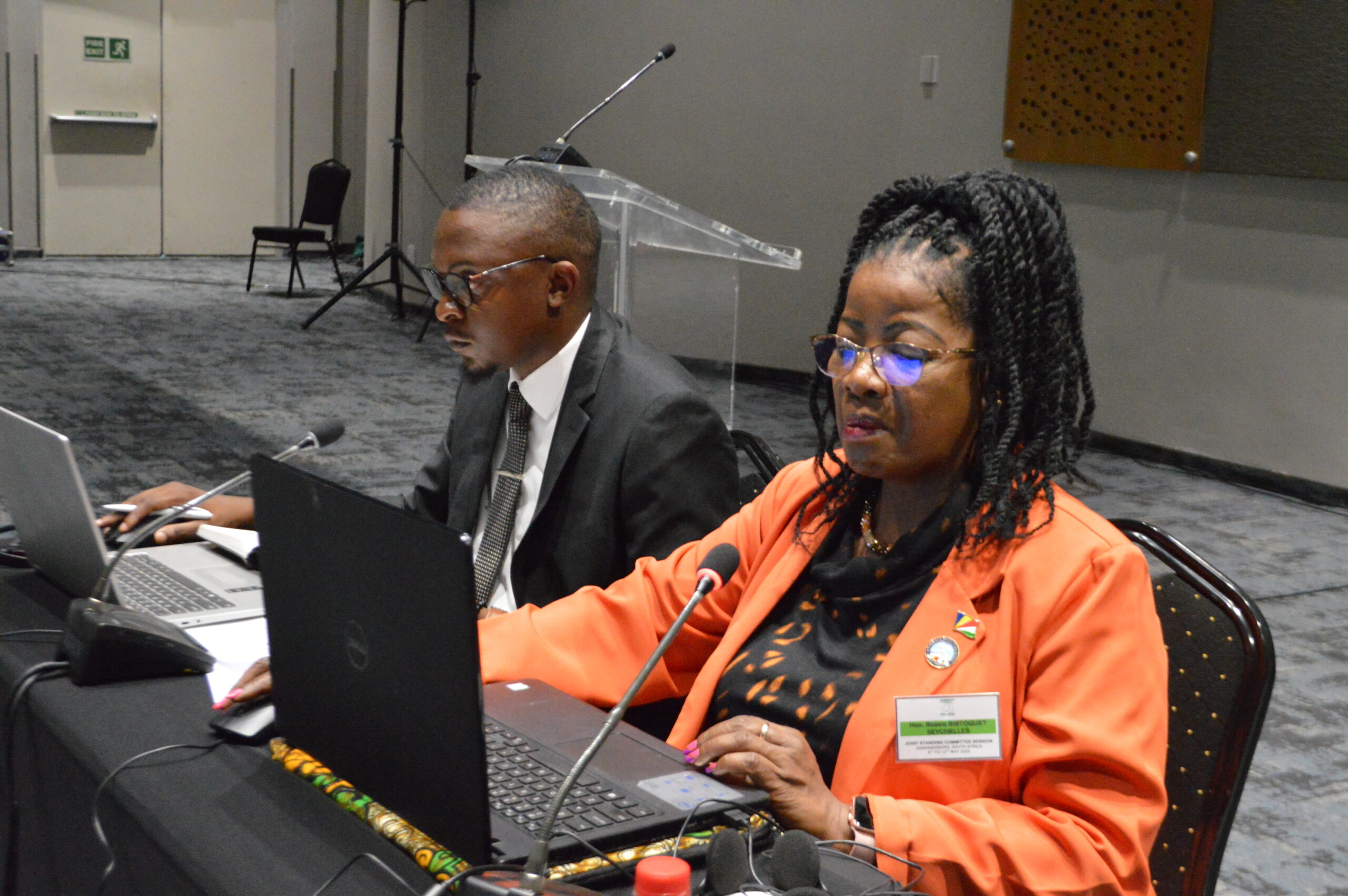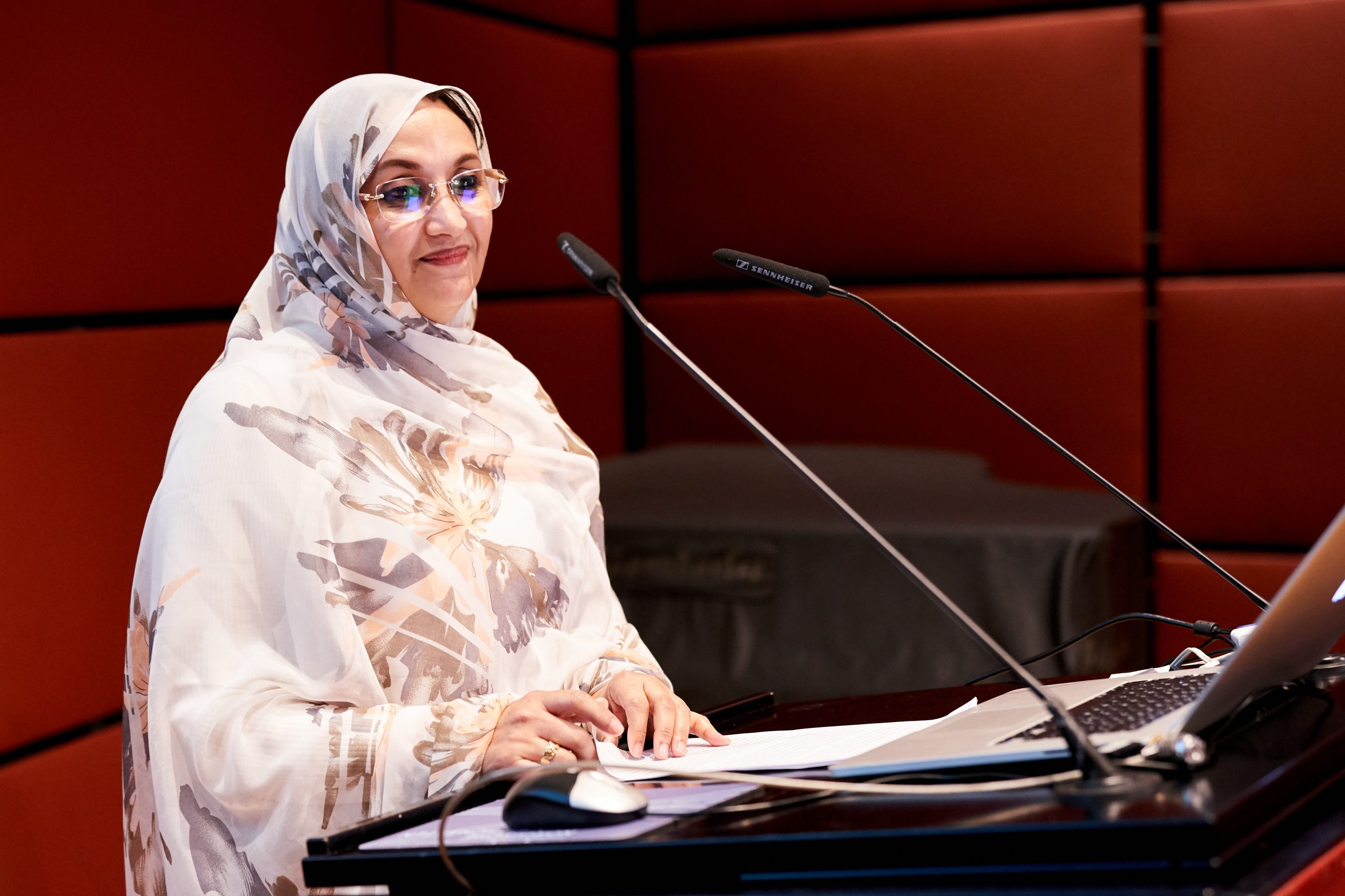
Honourable Rosie Bistoquet from Seychelles (right), the Chairperson of the Standing Committee on Human and Social Development and Special Programs (HSDSP) of the SADC Parliamentary Forum with Mr Munashe Tofa, the Secretary of her Committee. Photo: Moses Magadza
By Moses Magadza
JOHANNESBURGE, SOUTH AFRICA – SOUTHERN Africa Development Community (SADC) parliamentarians must abandon ineffective rhetoric and take decisive and swift action in discharging their mandate to shape the human and social development landscape of the region.
Honourable Rosie Bistoquet from Seychelles, the Chairperson of the Standing Committee on Human and Social Development and Special Programs (HSDSP) of the SADC Parliamentary Forum made the call when he delivered the welcoming remarks to the statutory meeting of her Committee in Johannesburg, South Africa on 09 May, 2023.

The meeting was held under the theme: ‘Parliaments’ role in legislating for strategic and sensitive assets taking into account the security of the nation, whilst encouraging direct investments’.
Bistoquet said the theme was a call for action for MPs, firstly, as legislators, and secondly as the representatives of the people, to effectively discharge their constitutional mandate in a manner that protects and promotes the security of nations in the SADC region.
She urged the Committee and the subsequent joint sittings, to call for an inclusive, and human-centric socio-economic and development trajectory that would enhance the overall collective human social development of the region.
To illustrate her point, she quoted eminent African businessman, Mo Ibrahim who said: “What we need in Africa is balanced development. Economic success cannot be a replacement for human rights or participation or democracy…it doesn’t work”.
Bistoquet then warned the parliamentarians that the SADC region they envisage may remain “illusory and ephemeral unless and unless we put at the fore, the inseparable human and social development”.
The meeting received a presentation from the SRHR Africa Trust and UNFPA, titled, ‘Strengthening Sexual and Reproductive Health and Rights (SRHR) in the Context of Climate Change and Emergency Situations.’
The presentation provided insights into the evident interlinkages between SRHR and the ever-imminent existential threat of climate change.
“Our legislative, budgetary, representative and oversight functions must be directed towards protecting and promoting SRHR in emergencies,” she said.
She hailed the UNFPA, “who have undoubtedly been the all-weather friend”.
Sexual and Reproductive Health and Rights (SRHR) are fundamental human rights that have close interconnections with all other human rights and thus need to be protected in a comprehensive manner, irrespective of competing priorities of government, according to a concept note distributed ahead of the meeting.
It said emergencies had exacerbated the pre-existing SRHR challenges, including high maternal mortality, teenage pregnancy, gender-based violence, and limited access to sexual and reproductive health services.
In addition, emergencies had disrupted the healthcare services and supply chains, making it more complex to provide comprehensive SRHR services to those affected.
It noted that when faced with social crises, some governments tend to deprioritize SRHR and make regressive steps in the implementation of the right to health.
The statutory meeting sought to expose Parliamentarians to SRHR challenges that are triggered during emergencies.
The lawmakers identified the SRHR needs of affected populations in emergency situations as well as key challenges and barriers to addressing SRHR in humanitarian response.
The meeting also aimed to highlight good practices and strategies for strengthening SRHR in emergency settings; and take cognizance of the main features of the SADC Gender Responsive Disaster Risk Reduction Strategic Plan and leverage on same to consolidate legislative and oversight frameworks.
Additionally, it sought to promote gender mainstreaming in disaster management and ensuring that women and key populations had an equal voice in decision-making processes on disaster management and recovery; and propose recommendations for policymakers, donors, and humanitarian actors to prioritize SRHR in emergency response.
Parliaments have a central role in ensuring the enactment of comprehensive disaster management legal frameworks that are cognizant of human rights as well as ensuring the development and effective implementation of disaster risk reduction policies, strategies, and plans.
A few case studies on the impact of climate change were outlined at the meeting.
In 2015, Malawi experienced a severe drought, which led to food shortages and increased child marriages. The Malawian government and UN agencies responded by providing food assistance and launching campaigns to discourage child marriages and promote girls’ education.
In March 2022, southern Malawi was hit by Tropical Storm Ana, and subsequently Cyclone Gombe which brought heavy rains and flooding to many districts.
According to the World Health Organisation (WHO), heavy rains caused extensive destruction of infrastructure and disruption of water and sanitation systems which triggered a Cholera outbreak.
In February this year (2023) Malawi, alongside Madagascar and Mozambique, was again hit by Tropical Cyclone Freddy, at a time the country was battling to contain Cholera.
The Committee noted that in Zimbabwe during Cyclone Idai in 2019, access to sexual and reproductive health services was disrupted, leading to increased cases of unintended pregnancies, sexually transmitted infections, and unsafe abortions.
The Zimbabwean government and humanitarian organizations collaborated to establish mobile clinics to provide SRHR services to affected communities.
In 2020, Mozambique experienced a surge in teenage pregnancies and gender-based violence during the Covid-19 pandemic. The government and civil society organizations launched awareness campaigns and provided remote counselling services to victims of gender-based violence.
Over the past two years, the SADC Island states of Madagascar, Mauritius and Seychelles have been affected by intense tropical cyclones and storms which have disrupted the health sector value chain.
While concerted efforts have been made by the respective governments to minimize impact and disruptions, the increasing frequency and intensity of catastrophic weather events continue to threaten the health and SRHR value chain by shifting the focus of state budgets to infrastructure repairs, the Committee noted.
The Committee agreed that strengthening SRHR in emergency situations was critical to protecting the rights and well-being of affected populations, particularly women, girls, and marginalized populations.
It called for a comprehensive and multi-sectoral approach that includes health services, protection, and gender-based violence prevention and response.









